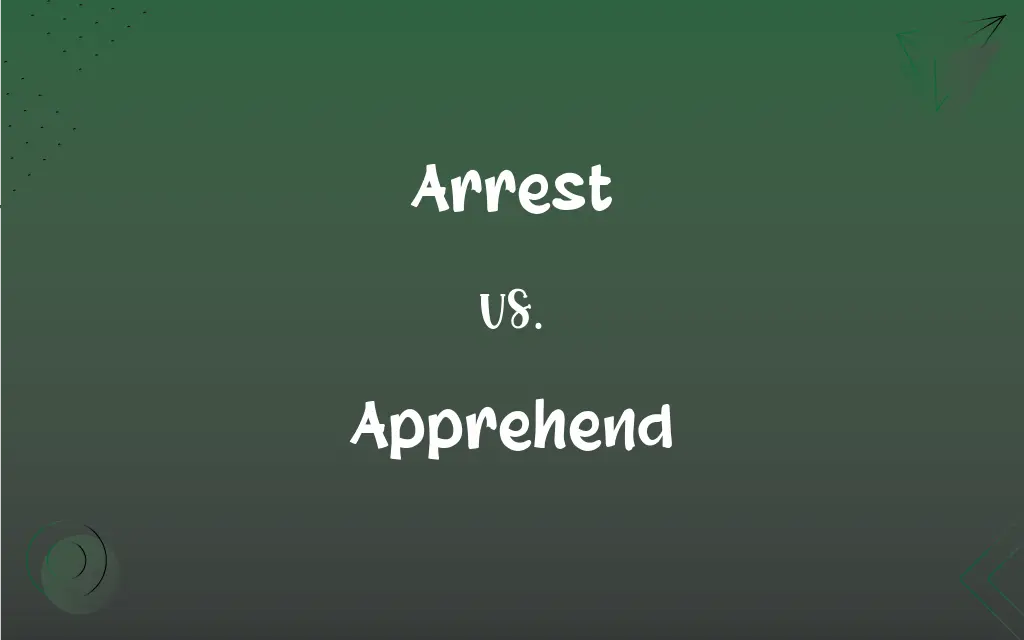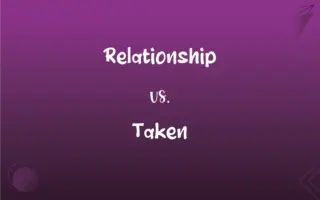Arrest vs. Apprehend: What's the Difference?
Edited by Aimie Carlson || By Harlon Moss || Updated on November 30, 2023
"Arrest" is the act of legally detaining someone, while "apprehend" means to capture or understand someone or something.

Key Differences
"Arrest" typically refers to the legal action where police or authorities detain a person suspected of a crime. It involves a formal process under the law. In contrast, "apprehend" can mean to physically capture someone, especially in the context of crime, but it also means to understand or grasp an idea.
When a person is "arrested," they are taken into custody with legal authority, often as a precursor to charges or legal action. "Apprehend" in the context of law enforcement is similar to arrest but can also refer more generally to the act of stopping or capturing someone, without the immediate implication of legal processing.
The term "arrest" is specifically associated with legal and formal procedures, including reading rights and booking processes. "Apprehend" does not inherently carry these legal connotations, although it is often used in law enforcement.
"Arrest" can also be used in non-legal contexts to mean stopping or hindering progress, such as "the arrest of disease progression." Conversely, "apprehend" in its other meaning refers to the mental grasp or understanding of information or concepts.
The use of "arrest" is often more formal and specific, while "apprehend" is more versatile, applying to both physical capture and mental understanding.
ADVERTISEMENT
Comparison Chart
Primary Meaning
Legal detention of a person
Capture or understanding of someone/something
Context
Legal, law enforcement
Law enforcement, general understanding
Legal Connotations
Strong, involves formal legal processes
Can imply capture, less formal legal process
Non-Legal Usage
Stopping/hindering progress
Mental grasp or understanding
Formality
More formal and specific
More versatile and broader in use
ADVERTISEMENT
Arrest and Apprehend Definitions
Arrest
Hindering Movement.
The obstacle arrest the flow of traffic.
Apprehend
Capture a Suspect.
Officers apprehend the fugitive after a chase.
Arrest
Stopping Progress.
The medication can arrest the disease's progression.
Apprehend
Grasp Mentally.
Children can apprehend new languages easily.
Arrest
Legal Detention.
The police made an arrest for the robbery.
Apprehend
Anticipate with Fear.
He apprehend the outcome of the meeting.
Arrest
Formal Capture.
The suspect was arrest at his home.
Apprehend
Understand a Concept.
She quickly apprehend the complex theory.
Arrest
Preventative Action.
Security measures arrest unauthorized access.
Apprehend
Seize Physically.
The guard apprehend the intruder.
Arrest
To stop; check
A brake that automatically arrests motion.
Arrested the growth of the tumor.
Apprehend
To take into custody; arrest
Apprehended the murderer.
Arrest
To seize and hold under the authority of law.
Apprehend
To grasp mentally; understand
"Science is the systematic method by which we apprehend what is true about the real world in which we live" (Richard Dawkins).
FAQs
What does "arrest" mean?
"Arrest" typically refers to the act of legally detaining someone, usually by the police, on suspicion of a crime.
Can "arrest" be used in a non-legal context?
Yes, metaphorically, "arrest" can describe something that captures attention or stops a process, like "an arresting image."
Is "arrest" only used for serious crimes?
No, "arrest" can be used for any crime, regardless of its severity, where legal custody is required.
Is "apprehend" the same as "arrest"?
"Apprehend" can mean to arrest, but it also has a broader sense of understanding or becoming aware of something.
Can "apprehend" mean understanding something intellectually?
Yes, in a non-legal context, "apprehend" often means to understand or grasp the meaning of something.
Can "arrest" refer to stopping a process?
Yes, it can metaphorically mean stopping or hindering a process, like "arresting the progress."
Is "apprehend" used in everyday language?
Less commonly than "arrest," and usually in the context of understanding or perceiving something.
What does "apprehend" imply in law enforcement?
In law enforcement, "apprehend" means to capture or arrest someone, usually a suspect or criminal.
What does "under arrest" mean?
"Under arrest" means being in police custody, usually with legal rights like the right to an attorney.
What is a synonym for "arrest"?
"Detain" is a common synonym, especially in legal contexts.
Can "apprehend" be used in a positive context?
Yes, when it relates to understanding or learning something, it can be positive.
Can "arrest" have medical meanings?
Yes, such as "cardiac arrest," where it means a sudden stop in function.
What part of speech is "arrest"?
It can be both a verb ("to arrest someone") and a noun ("an arrest was made").
Does "apprehend" have a physical connotation?
In law enforcement, it does, implying the physical act of capturing or detaining someone.
What is the difference in urgency between "arrest" and "apprehend"?
"Arrest" often implies a more immediate and formal action, whereas "apprehend" can be seen as a broader term, sometimes less urgent.
Does "arrest" always involve law enforcement?
Typically, yes, especially in its primary usage of detaining a suspect.
Is "apprehend" commonly used in police reports?
Yes, especially when describing the process of capturing a suspect.
Can "arrest" be a noun?
Yes, it can be a noun, as in "the arrest of a suspect."
Is "apprehend" used in legal documents?
Yes, but it's more common in narrative descriptions than in formal legal terminology.
How is "apprehend" used in criminal justice?
It's used to describe the action of law enforcement in capturing or detaining a suspect.
About Author
Written by
Harlon MossHarlon is a seasoned quality moderator and accomplished content writer for Difference Wiki. An alumnus of the prestigious University of California, he earned his degree in Computer Science. Leveraging his academic background, Harlon brings a meticulous and informed perspective to his work, ensuring content accuracy and excellence.
Edited by
Aimie CarlsonAimie Carlson, holding a master's degree in English literature, is a fervent English language enthusiast. She lends her writing talents to Difference Wiki, a prominent website that specializes in comparisons, offering readers insightful analyses that both captivate and inform.































































